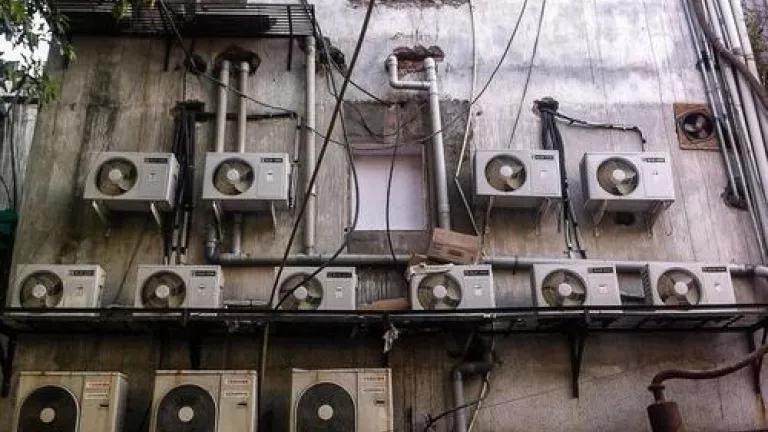Will Global Leaders Take the Immediate Opportunity for Climate Action During the Montreal Protocol Meeting in Dubai?

Blog post by Nehmat Kaur, Bhaskar Deol and Anjali Jaiswal.
While the Paris climate talks dominate headlines, world leaders have an immediate opportunity to take action on climate change. At the Montreal Protocol meetings next week, countries can agree to phase down hydrofluorocarbons (HFCs), potent heat trapping gases with thousand times more global warming potential than carbon dioxide.
During the Dubai meetings, the parties will discuss the final details of an amendment and if it can be reached. All countries agree that the Montreal Protocol regulates production and consumption of HFCs, while the UNFCCC regulates emissions of HFCs. The parties can start phasing down HFCs by agreeing to an amendment that formalizes the control of HFC production and consumption under the Montreal Protocol, including immediate reductions by developed nations and a future freeze for developing nations. That would be major progress.
Even though progress under the Montreal Protocol has been "achingly slow", the good news is that there is near unanimous support for achieving an amendment to the Montreal Protocol. High-level leadership is growing for an HFC amendment, as a result of the tremendous effort and goodwill put forth by countries, especially the Indian amendment proposal. It is clear that the parties can now move forward. The question is will the leaders rise to make an amendment happen - ahead of Paris?
An agreement to phase down HFCs embodies much of what the world is looking for in international treaties. It includes equity with developed nations going first and a "grace period" for developing nations. It includes financing through the proven Multilateral Fund. It includes tech-transfer with technologies tested in developed markets and patents set to expire before moving into developing markets. An amendment reached in Dubai would also send a strong signal ahead of Paris that international leaders can come together to protect the planet and mitigate climate change.
Under to the Montreal Protocol, chemicals like chlorofluorocarbons (CFCs) and hydrochlorofluorocarbons (HCFCs), used largely in vehicle and room air conditioners, must be phased out. The default replacement chemicals are HFCs. Unfortunately, HFCs are powerful greenhouse with global warming potential that can be up to 10,800 times higher than carbon dioxide. HFC emissions from many markets are growing exponentially, and air conditioner usage is growing equally fast, especially in developing markets. If HFC use in both room and vehicle air conditioners are not reduced substantially, climate change will occur at a much faster rate and could undo progress. Fortunately, commercially viable alternatives are emerging rapidly and transitioning to these alternatives can be safe and feasible, especially with the financial support from the Multilateral Fund.
Over 108 countries, including recent support from 54 African countries, support phasing down HFCs through an amendment to the Montreal Protocol. Countries like China, the European Union, Japan, Australia, and the United States - the world's largest economies - are already implementing regulations and market transitions of their own. Global markets are equally active in phasing down HFCs.
A summary chart by NRDC, Council on Energy, Environment and Water (CEEW), and Institute for Governance and Sustainable Development (IGSD) with inputs from experts, highlights the key features of each Montreal Protocol amendment proposals. NRDC has also developed an Excel-based analytical tool - called the "Interactive Montreal Protocol Amendment Comparison Tool" (IMPACT) - that translates the baseline formulas and reduction schedules of each proposal into carbon dioxide equivalent amounts of HFC consumption. The IMPACT tool is available to any party or observer.
Since the annual meeting of the parties last November, India has shown remarkable leadership by putting forward an amendment proposal in April. The progress on HFCs culminated after a series of engagements led by Minister Prakash Javadekar, as well as the many bilateral meetings with Prime Minister Narendra Modi and President Barack Obama, among other leaders. India along with many nations has built momentum and goodwill toward climate cooperation since the Modi administration was elected. The upcoming meeting in Dubai is a unique opportunity to put this global goodwill into action through an amendment of the Montreal Protocol, ahead of Paris, that locks in climate action now to benefit the planet.
Nehmat Kaur and Bhaskar Deol are NRDC India Consultants based in New Delhi, who will be attending the Meeting of Parties in Dubai.
Photo credit: Bhaskar Deol
---------------------------------------------------------------------------------------------------
Resources
The full Indian proposal is available here: http://conf.montreal-protocol.org/meeting/oewg/oewg-35/presession/default.aspx
The draft fact sheet by NRDC, CEEW and IGSD, analyzing the Indian proposal is available here: http://switchboard.nrdc.org/blogs/ajaiswal/Factsheet%20Proposed%20Amendments%20-%20Apr%2021.pdf
Publications for Further Reading
Primer on Hydrofluorocarbons, March 2015,
http://www.igsd.org/documents/HFCPrimer20March25.pdf
Reducing Stress on India's Energy Grid: The Power Sector Benefits of Transitioning to Lower Global Warming Potential and Energy Efficient Refrigerants in Room Air Conditioners, March 2015â¨
http://www.nrdc.org/international/india/files/india-energy-grid-alternative-refrigerants-IB.pdf
Energy Efficiency Gains with Lower Global Warming Impact: A Profile of Air Conditioners Using R-290, November 2014
http://ceew.in/pdf/ceew-nrdc-a-profile-of-air-conditioners-using-r290-30nov14.pdfâ¨
Frequently Asked Questions on HFCs, October 2014
http://www.nrdc.org/international/india/files/air-conditioner-efficiency-FS.pdfâ¨
Modelling Long Term HFC Emissions from India's Residential Air-Conditioning Sector, July 2014
http://ceew.in/pdf/CEEW-Final-Room-AC-Paper%2014Jul14.pdf â¨
Update on the HFC Phase-Down in Mobile Air Conditioning: Global Automakers Moving to HFO-1234yf, Except Some German Automakers Waiting for CO2 Systems, March 2014
http://www.igsd.org/documents/India_MAC_Draft_Final11MarchCEEWIGSDNRDClogos_002.pdfâ¨
Cooling India with Less Warming: The Business Case for Phasing Down HFCs in Room and Vehicle Air Conditioners, December 2013
http://www.nrdc.org/international/india/air- conditioner-efficiency.asp
